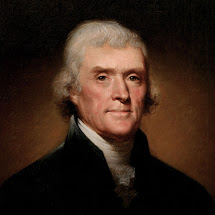“The Tree of Liberty must be refreshed from time to time
with the blood of patriots and tyrants. It is natural manure.”
Thomas Jefferson – November 1787
Letter to William Stephens Smith, son-in-law to John Adams
Hence began the urban legend that Jefferson advocated an overthrow of government every 7 to 20 years. I also believed Thomas Jefferson, our third President and one of our Founding Fathers, advocated an overthrow of government every so often. I was sure I heard it from my high school history teacher or I read it in a book. If my brain retains any information it is history; sponge-like.
Then came January 6, 2021. I heard some Trump supporters quote the Jefferson urban legend “we need a revolution every 7 years.” I thought to myself, “Oh no, I think they maybe on to something.” But wait, I did not remember the quote used in such a context as the Trump supporters professed was gospel. In fact, did Jefferson actually say these words at all? If so, what did he really mean?
Not to be taken out of context, below is the complete paragraph Jefferson wrote in November of 1787 to William Stephens Smith, son-in-law to John Adams.
“What country before ever exited a century & half without a rebellion? & what country can preserve it’s liberties if their rulers are not warned from time to time that their people preserve the spirit of resistance? Let them take arms. The remedy is to set them right as to facts, pardon & pacify them. What signify a few lives lost in century or two? The tree of liberty must be refreshed from time to time with the blood of patriots & tyrants. It is its natural manure.” – Thomas Jefferson.(1)
Before he penned the above quote to Mr. Stephens, Jefferson’s previous letters indicated he had a strong appetite for revolution and rebellion against any government that oppresses the citizenry. In a letter he wrote to James Madison on January 30, 1787, Jefferson formulated three forms of distinguishable government. “Societies exist under three forms sufficiently distinguishable. One, without government, as among our Indians. Two, under governments wherein the will of every one has just influence, as is the case in England in a slight degree, and in our states in a great one. Third, under governments of force: as is the case in all other monarchies and in most of the other republics.”(2)
Click on the below YouTube link to view a short four minute video on the life of Thomas Jefferson. There are some amazing facts in this video. I hope you enjoy.
“Even this evil is productive of good. It prevents the degeneracy of government, and nourishes a general attention of public affairs. I hold it that a little rebellion now and then is a good thing, and as necessary in the political world as storms in the physical. Unsuccessful rebellions indeed generally establish the encroachments on the rights of the people which have produced them…It is medicine necessary for the sound health of government.”(2)
“A revolution is coming – a revolution which will be peaceful if we are wise enough; compassionate if we care enough; successful if we are fortunate enough – but a revolution which is coming whether we will it or not. We can affect its character; we cannot alter its inevitability.” – Robert F. Kennedy, May 1966


Leave a Reply